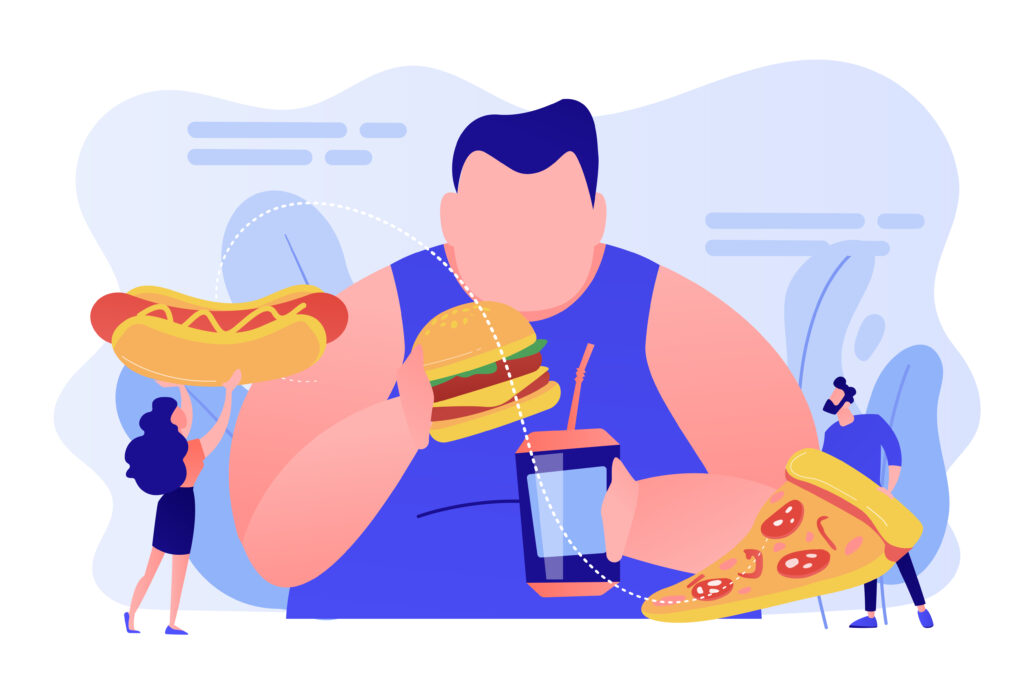
Emotional eating is a complex behavior that can significantly contribute to obesity, creating a cycle that is difficult to break. Many individuals turn to food as a source of comfort during stressful, sad, or anxious times, leading to overeating and unhealthy food choices. This coping mechanism often results in excessive calorie intake, which, over time, can lead to weight gain and associated health issues.
Understanding the underlying psychological triggers of emotional eating is essential for breaking free from these unhealthy habits. In this article, we will explore the relationship between emotional eating and obesity, identify common triggers, and provide practical strategies to help individuals cultivate a healthier relationship with food. By addressing emotional eating head-on, you can take significant steps toward achieving lasting weight management and improving your overall well-being.
What Is Emotional Eating?

Emotional eating is the act of using food to cope with emotions rather than to satisfy physical hunger. When people experience stress, sadness, boredom, or even happiness, they may turn to food for comfort, often craving high-calorie, sugary, or fatty foods. Unlike physical hunger, which develops gradually and can be satisfied with any type of food, emotional hunger is sudden and tends to drive cravings for specific comfort foods. Emotional eating can lead to overeating, weight gain, and unhealthy eating habits, as it doesn’t address the underlying emotional triggers but instead creates a cycle of emotional eating and guilt. Recognizing emotional eating is the first step toward breaking free from this pattern and establishing a healthier relationship with food.
Emotional vs. Physical Hunger: Key Differences
Understanding the key differences between emotional and physical hunger is essential for managing eating habits effectively. Physical hunger develops gradually and is the body’s natural signal that it needs nourishment, often satisfied with any type of food. It is accompanied by physical cues like a growling stomach, low energy, or lightheadedness.
Emotional hunger, on the other hand, comes on suddenly and is driven by emotions such as stress, boredom, or sadness. It often leads to cravings for specific comfort foods, like sugary or fatty snacks, and isn’t satisfied even after eating. Unlike physical hunger, emotional hunger can result in feelings of guilt or regret after eating. Recognizing these differences can help you make healthier choices and avoid overeating in response to emotions.
Common Triggers of Emotional Eating (Stress, Boredom, Sadness, etc.)
Common triggers of emotional eating, such as stress, boredom, sadness, and anxiety, can lead to unhealthy eating habits that derail weight loss and wellness efforts. When faced with stress, the body releases cortisol, increasing cravings for high-calorie comfort foods.
Similarly, boredom often prompts mindless snacking, even when physical hunger isn’t present, as a way to pass time or avoid feelings of emptiness. Sadness or emotional distress can cause people to seek solace in food, particularly sugary or fatty options, in an attempt to lift their mood temporarily. Understanding these emotional triggers is crucial for breaking the cycle of emotional eating and developing healthier coping mechanisms, such as exercise, hobbies, or mindfulness practices. By addressing the root causes of emotional eating, you can improve your relationship with food and support long-term health goals.
How Emotional Eating Impacts Weight Gain
Emotional eating significantly impacts weight gain by leading to the consumption of excess calories, often from high-sugar, high-fat comfort foods. When individuals eat in response to emotions like stress, anxiety, or sadness, rather than physical hunger, they tend to consume more food than their body needs for energy. This results in a calorie surplus, which the body stores as fat over time. Additionally, emotional eating bypasses the body’s natural hunger and fullness cues, making it easier to overeat without realizing it. Repeated cycles of emotional eating can contribute to weight gain and make it difficult to maintain a healthy weight, as the underlying emotional triggers remain unresolved, driving unhealthy eating habits.
The Psychological and Biological Factors Behind Emotional Eating

The psychological and biological factors behind emotional eating are deeply intertwined. When faced with stress or negative emotions, the body releases cortisol, a hormone that increases cravings for high-calorie, comfort foods. This biological response is tied to the brain’s reward system, where eating these foods triggers the release of dopamine, providing temporary feelings of pleasure and relief. However, this creates a cycle where emotional discomfort leads to overeating as a coping mechanism. Psychologically, emotional eating often stems from unaddressed feelings such as anxiety, sadness, or boredom, causing individuals to seek comfort in food rather than resolving the root cause. Understanding these factors is key to breaking the habit of emotional eating and building healthier coping strategies.
The Role of Stress Hormones (Cortisol) in Food Cravings
Stress hormones, particularly cortisol, play a significant role in driving food cravings, especially for unhealthy, high-calorie foods. When you’re stressed, your body releases cortisol, which triggers the “fight or flight” response. This hormone not only increases appetite but also leads to cravings for comfort foods rich in sugar and fat, as the body seeks quick energy to cope with stress. Over time, elevated cortisol levels can contribute to weight gain, particularly around the abdominal area, as the body stores excess fat in response to stress. Managing stress effectively is crucial for reducing cortisol levels and avoiding stress-related food cravings, which can derail weight loss and healthy eating efforts.
The Brain’s Reward System: How Certain Foods Provide Temporary Comfort
The brain’s reward system plays a crucial role in emotional eating, as certain foods provide temporary comfort by triggering the release of “feel-good” chemicals like dopamine. Sugary, fatty, and highly processed foods activate this reward center, offering a quick but short-lived sense of pleasure and relief from negative emotions like stress, sadness, or anxiety. This creates a cycle where people repeatedly turn to comfort foods to soothe emotional discomfort, reinforcing unhealthy eating habits. While these foods may offer momentary satisfaction, they don’t address the underlying emotional issues and can lead to overeating and weight gain. Understanding how the brain’s reward system influences cravings is key to breaking the cycle and developing healthier coping strategies for managing emotions.
Emotional Eating and the Cycle of Guilt
Emotional eating often leads to a cycle of guilt, where individuals turn to food for comfort during times of stress, sadness, or boredom, only to feel regret or shame afterward. This guilt stems from eating in response to emotions rather than hunger, often leading to overeating or consuming unhealthy, high-calorie foods. The temporary relief provided by emotional eating quickly fades, and feelings of guilt can cause even more emotional distress, perpetuating the cycle. This cycle can make it difficult to break free from emotional eating habits, as the guilt can trigger further emotional eating episodes. Recognizing and addressing this pattern is crucial for creating a healthier relationship with food and breaking the emotional eating cycle.
How Emotional Eating Leads to Obesity

Emotional eating can significantly contribute to obesity by leading to the consumption of excessive calories, particularly from unhealthy, high-fat, sugary foods. When individuals eat in response to emotions like stress, boredom, or sadness, rather than hunger, they often choose comfort foods that are calorie-dense but low in nutrients. Over time, this can result in a calorie surplus, causing the body to store excess energy as fat. Additionally, emotional eating tends to bypass natural hunger and fullness cues, leading to overeating and weight gain. The repeated cycle of using food to manage emotions, without addressing the underlying issues, can make it difficult to maintain a healthy weight, ultimately increasing the risk of obesity.
The Caloric Impact of Comfort Foods
The caloric impact of comfort foods can be significant, making them a major contributor to weight gain and unhealthy eating habits. Comfort foods, which are often high in sugar, fat, and refined carbohydrates, are calorie-dense but low in essential nutrients. When consumed in response to emotions like stress or sadness, these foods can quickly lead to a caloric surplus, causing the body to store excess energy as fat. Regularly indulging in these foods as a coping mechanism can hinder weight loss efforts and lead to long-term health issues. Understanding the caloric content of comfort foods is essential for making healthier choices and managing weight effectively.
Overeating and Lack of Nutritional Balance
Overeating and a lack of nutritional balance can greatly hinder weight loss efforts and overall health. When individuals consistently consume more calories than their body needs, particularly from foods high in sugar, fat, and refined carbs, it leads to excess weight gain. This is often compounded by a lack of nutritional balance, where diets are deficient in essential nutrients like fiber, protein, and healthy fats. These imbalances not only result in overeating but also leave the body unsatisfied, leading to frequent cravings and poor food choices. Without proper nutrition, the body struggles to maintain energy levels, regulate metabolism, and support overall well-being. Prioritizing balanced, nutrient-rich meals can help prevent overeating and support long-term weight management.
Emotional Eating’s Contribution to Weight Gain Over Time
Emotional eating contributes to weight gain over time by leading to the consistent consumption of high-calorie, nutrient-poor foods in response to stress, boredom, or negative emotions. Unlike physical hunger, emotional eating often causes individuals to crave comfort foods that are rich in sugar, fat, and refined carbs, resulting in frequent overeating. Over time, these extra calories accumulate, leading to weight gain, particularly if the emotional triggers behind the eating remain unaddressed. Additionally, emotional eating disrupts the body’s natural hunger and fullness cues, making it harder to control portion sizes and maintain a healthy diet. This ongoing pattern of emotional eating can create long-term challenges for weight management and overall health.
Identifying Emotional Eating Patterns

Identifying emotional eating patterns is crucial for breaking the cycle of overeating and making healthier choices. Emotional eating often occurs in response to specific triggers like stress, boredom, or anxiety, rather than actual hunger. To recognize these patterns, it’s important to pay attention to when and why you’re eating. Keeping a food journal can help track what you eat, how you feel before and after meals, and any emotional triggers that lead to eating. Signs of emotional eating include sudden cravings for specific comfort foods, eating when you’re not physically hungry, and feelings of guilt or regret after eating. By identifying these patterns, you can begin to address the emotional triggers and develop healthier coping mechanisms.
How to Recognize Emotional Eating Behaviors
Recognizing emotional eating behaviors is key to gaining control over unhealthy eating patterns and managing your weight effectively. Emotional eating often happens when you eat in response to feelings like stress, boredom, or sadness, rather than physical hunger. Key signs include sudden, intense cravings for specific comfort foods, eating when you’re not hungry, or turning to food as a way to soothe emotions. Another common indicator is feeling guilty or regretful after eating, especially when you’ve consumed more than you intended. To identify these behaviors, keep track of your eating habits, emotions, and triggers to determine if you’re eating for comfort rather than nourishment.
Journaling to Track Your Emotional and Eating Patterns
Journaling is an effective tool for tracking emotional and eating patterns, helping you understand the connection between your emotions and food choices. By recording what you eat, when you eat, and how you feel before and after meals, you can identify emotional triggers that lead to overeating or unhealthy food choices. This self-awareness can reveal patterns, such as turning to comfort foods when stressed or eating out of boredom rather than hunger. Journaling also helps you reflect on your progress and recognize areas where you can make healthier changes. Over time, it becomes easier to break the cycle of emotional eating and adopt more mindful, balanced eating habits that support weight management and overall well-being.
Signs That You’re Eating for Comfort, Not Hunger
Recognizing the signs that you’re eating for comfort rather than hunger is crucial for breaking unhealthy eating habits. Emotional or comfort eating often happens suddenly, triggered by feelings like stress, anxiety, or boredom, whereas true physical hunger builds gradually. IOther signs include eating mindlessly, continuing to eat even when you feel full, or turning to food as a reward or distraction. After comfort eating, feelings of guilt or regret may follow, further indicating that the eating was driven by emotions rather than hunger. Identifying these signs can help you gain control over emotional eating and develop healthier coping strategies.
Building a Sustainable Relationship with Food
Building a sustainable relationship with food is essential for long-term health and weight management. It involves shifting your mindset from viewing food as a source of comfort or reward to seeing it as nourishment for your body. This means practicing mindful eating—paying attention to hunger and fullness cues, savoring your meals, and making balanced, nutritious choices that fuel your body. A sustainable relationship with food also includes allowing yourself to enjoy treats in moderation without guilt, recognizing that no food is inherently “bad.” By focusing on balance, portion control, and a variety of nutrient-dense foods, you can create a healthy eating routine that is both enjoyable and sustainable for life, supporting overall well-being.
Developing Positive Emotional Coping Strategies
Developing positive emotional coping strategies is essential for breaking free from emotional eating and maintaining a healthy lifestyle. Instead of turning to food for comfort during stressful or emotional times, adopting healthier coping mechanisms like exercise, meditation, or journaling can help you manage emotions more effectively. These activities not only relieve stress but also boost your mood, helping to address the emotional triggers behind overeating. Building a strong support system—talking to friends, family, or a therapist—can also provide emotional relief without resorting to unhealthy eating habits. By focusing on positive coping strategies, you can better manage your emotions, reduce emotional eating, and create a balanced approach to both mental and physical health.
Creating a Balanced, Enjoyable Diet

Creating a balanced, enjoyable diet is essential for achieving long-term health and weight management. A well-rounded diet includes a variety of nutrient-dense foods, such as fruits, vegetables, whole grains, lean proteins, and healthy fats, which provide the essential nutrients your body needs to function optimally. The key is to focus on moderation and variety, allowing for the occasional indulgence without guilt. By incorporating a range of flavors and textures, you can make meals more satisfying and enjoyable, reducing the temptation to turn to comfort foods during emotional moments. . Ultimately, a balanced diet should not only nourish your body but also delight your taste buds, fostering a sustainable approach to healthy eating.
Long-Term Mindset: Progress Over Perfection
Adopting a long-term mindset focused on progress over perfection is crucial for sustainable weight management and overall well-being. Instead of striving for an unattainable ideal, embracing gradual improvements allows for flexibility and resilience in your eating habits and lifestyle choices. This perspective encourages you to celebrate small victories, such as choosing a healthy meal or incorporating regular physical activity, rather than fixating on occasional setbacks or indulgences. By recognizing that healthy living is a journey, not a destination, you can cultivate a more positive relationship with food and your body. This mindset helps reduce stress and guilt associated with dieting, ultimately fostering long-term success and a more balanced approach to health and wellness.
Conclusion
In conclusion, understanding the intricate relationship between emotional eating and obesity is crucial for breaking free from unhealthy habits and achieving lasting weight management. Implementing positive coping strategies, maintaining a balanced diet, and adopting a long-term mindset focused on progress can pave the way for healthier choices. Remember, the journey to overcome emotional eating is not about perfection; it’s about progress and finding a sustainable path to wellness. By fostering self-awareness and nurturing a positive relationship with food, you can take control of your emotional eating habits, improve your overall well-being, and ultimately lead a healthier, more fulfilling life.
FAQs
1. What is emotional eating?
Emotional eating is the practice of using food to cope with feelings such as stress, sadness, or boredom rather than eating in response to physical hunger. It often involves craving specific comfort foods that provide temporary relief from negative emotions.
2. How does emotional eating contribute to obesity?
Emotional eating can lead to excessive calorie consumption, particularly from unhealthy, high-calorie foods. Over time, this behavior can create a calorie surplus, resulting in weight gain and an increased risk of obesity.
3. What are common triggers for emotional eating?
Common triggers for emotional eating include stress, anxiety, depression, boredom, and even happiness. Situational factors, such as relationship issues or work-related stress, can also prompt emotional eating behaviors.
4. How can I recognize if I’m emotionally eating?
Signs of emotional eating include eating when you’re not physically hungry, craving specific comfort foods, feeling guilty or ashamed after eating, and using food as a reward or distraction from emotions.
5. What are effective strategies for breaking the cycle of emotional eating?
To break the cycle of emotional eating, try keeping a food journal, practicing mindfulness, developing positive coping mechanisms (like exercise or hobbies), and seeking support from friends, family, or a therapist.
6. Can emotional eating be managed through diet?
Yes, adopting a balanced, nutritious diet can help mitigate emotional eating. Focus on incorporating a variety of whole foods that nourish your body, which can help regulate mood and reduce cravings for unhealthy comfort foods.
7. How can I develop healthier coping strategies?
To develop healthier coping strategies, consider activities like meditation, deep breathing exercises, engaging in creative pursuits, or spending time with loved ones. Finding fulfilling alternatives to food can help manage emotions more effectively.
8. Is it possible to overcome emotional eating completely?
While it may be challenging to eliminate emotional eating entirely, it is possible to reduce its frequency and impact by increasing self-awareness, understanding emotional triggers, and implementing healthier coping strategies.
9. How long does it take to change emotional eating habits?
Changing emotional eating habits varies for each individual. It often requires consistent effort, patience, and practice. With dedication and the right strategies, you can see positive changes in a few weeks or months.
10. When should I seek professional help for emotional eating?
If emotional eating is significantly impacting your quality of life, mental health, or physical well-being, consider seeking professional help from a therapist, dietitian, or counselor who specializes in eating disorders or emotional eating.




Some really nice stuff on this web site, I enjoy it.